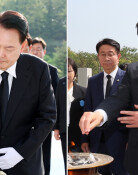Korean foreign minister urges Japan to heal past wounds
Korean foreign minister urges Japan to heal past wounds
Posted September. 28, 2013 04:27,
Visiting New York to attend the United Nations General Assembly, Foreign Minister Yun Byung-se held a bilateral meeting with his Japanese counterpart Fumio Kishida, but only confirmed differences in their views. Watchers say that considering the mood of the foreign ministers meeting on the day, it will take a long time before Korea and Japan hold a bilateral summit.
The ministers opened their meeting at Intercontinental Hotel in Manhattan, New York on Thursday by exchanging congratulatory words wishing for the success of the 2018 Pyeongchang Winter Olympics in Korea and the 2020 Tokyo Summer Olympics in Japan. But the ministers looked gloomy on their face when they were leaving the venue of the meeting. In his opening remarks, Yun said, As President Park Geun-hye said at her congratulatory speech on Koreas Liberation Day on August 15, I urge the Japanese government to display a courageous leadership to heal the past wounds. The minister also urged Tokyo to reconsider Japans bids to register Mitsubishi Nagasaki dockyard and other sites, which had used slave labor from Korea, as UNESCO World Cultural Heritages. He also urged the Japanese government to take tangible measures to stop anti-Korea rallies by rightist groups in Japan.
Japanese Foreign Minister Kishida stopped short of giving specific answer, only commenting, There is no change to the Shinzo Abe cabinets stance to inherit the recognition of past history from past cabinets. According to Kyoto News Agency, at a press briefing for Japanese media after the ministerial meeting, Kishida said, Legal issues over victims of forced labor were resolved through the Korea-Japan treaty in 1965. If Koreas Supreme Court upholds a ruling in favor of (forced labor) against Japan, bilateral relations will further deteriorate, in reiterating the Japanese cabinets position.
Instead, Japan demanded Korea to lift restrictions on import of fisheries products from eight prefectures in Japan, including Fukushima Prefecture. Yun said, The ban is a preventive and provisional measure that was inevitably put in place due to spreading fears over the safety of Japanese fisheries products due to contaminated water leaking from nuclear power plants.







